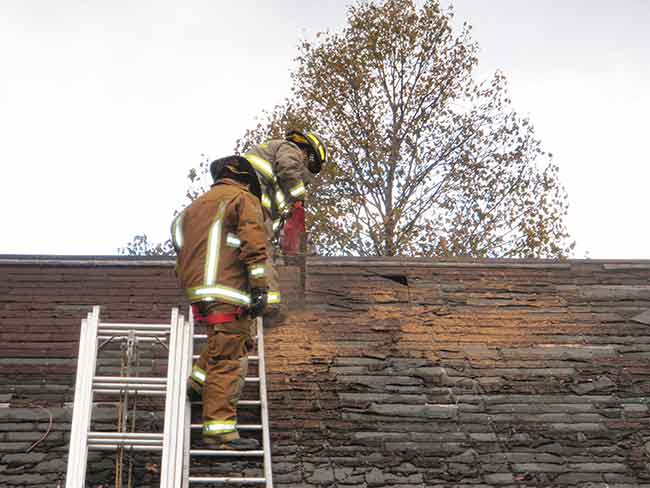
Back to basics – April 2016
Mark Van
Features Fire Ground TrainingPeer pressure is present in every fire station and can contribute to dangerous situations.
 Firefighters can face negative peer pressure from colleagues to wear their PPE incorrectly Peer pressure can have detrimental effects on recruits in the fire service
Firefighters can face negative peer pressure from colleagues to wear their PPE incorrectly Peer pressure can have detrimental effects on recruits in the fire servicePeer pressure is basically influence by members of a person’s peer group. This influence can be good or bad for firefighters. Positive peer pressure helps firefighters develop good habits such as placing their gear by the trucks in a manner that allows for quick and easy donning.
Unfortunately, the negative influence sometimes outweighs the good and causes firefighters to develop bad habits. Similar to complacency, which we discussed in the January issue of Canadian Firefighter, peer pressure to skirt rules and regulations is a reason why firefighters need to learn and develop survival skills.
Negative peer pressure stems from the oddball factor – the idea that individuals stand out because they follow the rules, and, in order for them to fit in, they adapt to what their peers are doing. Firefighters who choose to follow the rules instead of fit in with the group may be teased, ridiculed or alienated. Peer pressure is the result of people doing their best to make sure individuals conform to their idea of acceptable behaviour.
Peer pressure can have detrimental effects on recruits in the fire service. While seasoned firefighters might stand up against peer pressure, ignore it, overcome it and carry on, rookies might be more inclined to go along with the group. An experienced firefighter may even be able to break the cycle of peer pressure and influence the group to change its ways.
I believe firefighters face the greatest peer pressure over the way they wear PPE. I use the term GQ firefighter to describe and explain this type of peer pressure. GQ firefighters are those who want to look fashionable and stylish so that they can be perceived as being cool or tough. A GQ firefighter wants to look like a model on the front cover of any men’s magazine.
Photo 1 shows an example of one GQ firefighter look: suspenders hanging down around the waist. As insignificant as this violation may be compared to other fire-ground issues, it is one domino in a potential series that can result in a bad outcome. Firefighters’ suspenders are designed to hold up their pants. If firefighters are carrying small equipment in their pants pockets (and they should be), there will be considerable weight pulling the pants downwards, which could leave an area of their lower bodies exposed. How is that going to feel inside a burning building?
Another GQ firefighter look is a helmet strap that is either undone or around the back of the helmet. I have seen helmet straps fashioned like this everywhere, even on television shows such as Chicago Fire. In one episode, every time the firefighters were fully dressed in their PPE, the major characters were not wearing their chin straps properly; they all had the GQ look.
How do GQ firefighters contribute to the risk of individuals needing self-rescue? The smaller issues lead to bigger issues. If firefighters are complacent about the small stuff and bow to peer pressure over the small issues, think about how much more complacent and susceptible to peer pressure they will become about the big stuff.
Just as gateway drugs lead toward more severe drugs, the small issues on the fire ground and in the station lead to more severe and deadlier issues on the fire ground.
Training is one remedy for overcoming peer pressure. If we train as we play we will become accustomed to wearing our PPE the right way, all the time. Firefighters need to develop a strong sense of what the gear feels like when it is on so that they will know when they are missing a component of PPE.
Another remedy for eliminating peer pressure is enforcement; this has to come from the top down. Every department has rules and regulations, SOPs or SOGs, policies and whatever else you want to call them: but are they being enforced? Strong enforcement of rules is for the safety and survival of each firefighter. Enforcement of proper PPE practices will quickly stomp out any GQ-firefighter type practices and send a message to others not to follow suit.
Positive peer pressure to develop good habits can overtake the pressure to develop bad habits. If the majority of firefighters lead the way by encouraging safe practices, others will follow; anyone who doesn’t will become the oddball.
Mark van der Feyst has been in the fire service since 1999 and is a full-time firefighter in Ontario. He teaches in Canada, the United States and India and is the lead author of Residential Fire Rescue. Mark@FireStarTraining.com
Print this page